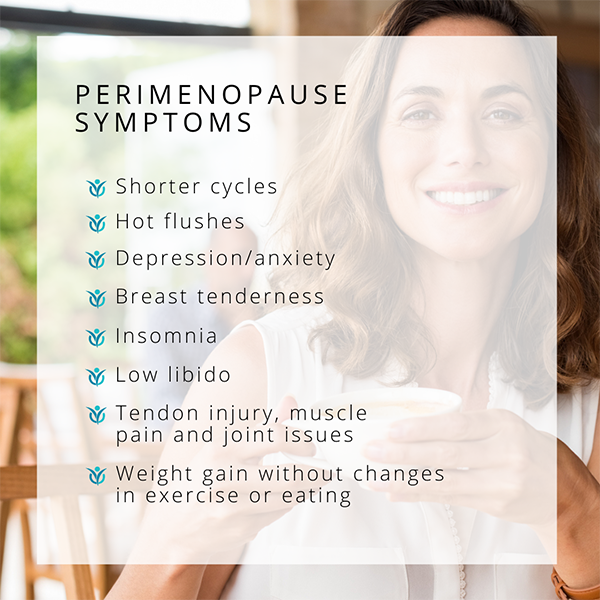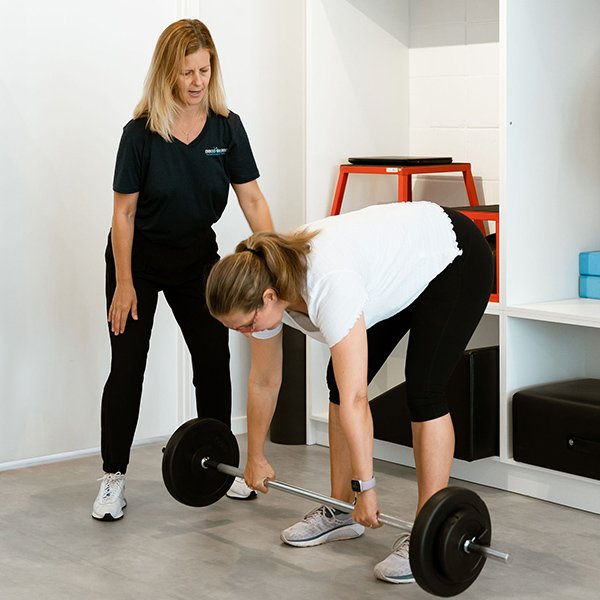Improve fitness and reduce perimenopause symptoms
Are you struggling with fatigue, mood changes, weight gain and/or pain that is affecting your ability to exercise?
As you get older, your body changes. For many women, that means your body feels less familiar than it did before.
From around the age of 35-40, female hormones begin to alter as you move towards the cessation of menstruation. This period of change lasts around 7-10 years and is known as perimenopause.
Most women have heard about poor sleep and hot flushes associated with being perimenopausal. But other less well-known symptoms can also have a big impact on your life including tendon and joint injuries, variations in your menstrual cycle, shifting moods, weight gain or other physical and mental changes.
Some of the symptoms that result from changes in Oestrogen can also affect your ability to exercise as you have previously. Oestrogen is a hormone important for muscle strength and the integrity of our connective tissues and tendons. Often exercise needs to adjust to these impacts to prevent injury or pain.
There's a lot you can do to support your body and mind during this time to remain healthy, strong and active. As your body changes, your lifestyle should change too.
Embody Movement can help you stay healthy, strong and active
The Embody Movement team has extensive experience supporting women through perimenopause and beyond.
Our Physiotherapists and Exercise Physiologists can:
Provide effective exercises to guide you through perimenopause, including classes aimed at improving strength, fitness and mobility without causing injury.
Help manage chronic or unresolved pain.
Demonstrate exercises to help build bone strength (essential for the prevention of osteoporosis).
Develop a safe exercise program.
Our Women’s Health Physiotherapists can:
Provide useful information about good pelvic health.
Guide you safely through the hormonal changes occurring.
Help you maintain a healthy weight.
Support lifestyle changes to improve overall health and wellbeing.
To book an initial consult with our Women’s Health Physiotherapists or Exercise Physiologists call 07 5337 9853, or book online.
Symptoms and signs of perimenopause
Perimenopause will present differently in each woman, but is ultimately a change in your menstrual cycle and usually occurs during your mid-40s. During this time oestrogen levels and progesterone levels can become erratic and will change each cycle.
Although symptoms of perimenopause vary between women, some of the more common signs include:
Shorter menstrual cycles.
Hot flushes and night sweats.
Insomnia and sleep disturbance.
Depression, anxiety and low mood.
Breast tenderness.
Vaginal dryness and incontinence.
Low libido.
Weight gain without changes in exercise or eating habits.
Tendon injury, muscle pain and joint issues.
Self-care is even more important as you age
Menopause is defined as the date 12 months after your last menstrual period. Once this day has passed, you are considered post-menopausal. The average age of menopause in Australia is 51 years but it can range from 45 – 58 years old.
For many women, fluctuating hormones have eased at this point and symptoms are more subtle. For some women, symptoms such as hot flushes, vulvo-vaginal pain and dryness may remain.
As women approach menopause, chronic disease becomes more common and is linked with the changes in hormones occurring during perimenopause and menopause. These diseases include osteoporosis, diabetes, heart disease and dementia.
That’s why self-care is more important than ever at this time of life.
Hormones in Harmony: A guide to balanced hormones eBook
Embody Movement Physiotherapy & Pilates has created a 40-page eBook to educate and inform women about perimenopause and menopause.
Our team answer common questions and provide useful information about hormones, symptoms and symptom management.
Get tips on how to manage symptoms and feel your best.
Further reading and helpful resources
Nutrition and menopause: finding your ‘Goldilocks Zone’
Learn the importance of good nutrition and the right diet for managing perimenopause symptoms and weight gain.
Mind over menopause - how regular exercise can help
Lifestyle changes including exercise can be the answer to managing the changes in your body and preventing chronic disease.
Have questions? Contact us
Please complete the form below if you have any questions. Alternatively, give our team a call on 07 5337 9853 or book online.












